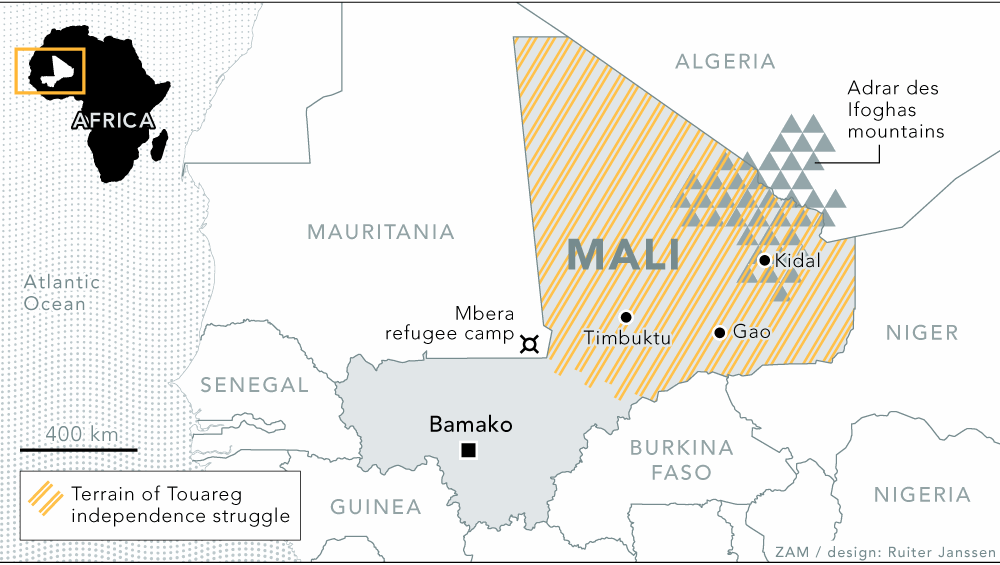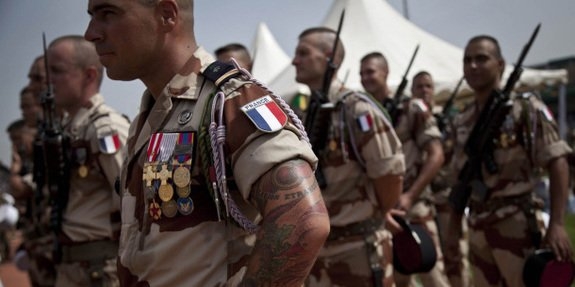The French anti-jihadist forces’ new romance with Touareg rebels in the north is making Mali’s government very unhappy.
When French President François Hollande visited Timbuktu in 2013 after Operation Serval, -in which a French-led western force liberated the northern Mali region from a repressive jihadist regime-, he was applauded and cheered in the streets. At a festive ceremony in the city’s main square the grateful Malian people also presented him with a lavishly dressed camel.
But that honeymoon is over. Mali’s government, and public opinion in the capital Bamako, in the south, are no less than disgusted at the way French operations in the north have developed. Talk of ‘liberation’ has changed into complaints about ‘occupation’. The French promised, after all, that they would not stay. That was five years ago.
It’s not that there isn’t still broad consensus on the necessity to fight the bandit-type jihadis of Ansar Dine, AQIM and Mujao. These groups, some of which are associated with smuggling gangs and obtain finance also from hostage-taking, now operate mostly from the northern Ifhogas mountains and still carry out attacks from there. But many Malians are angry about the way the French are conducting their present ‘war on terror’: in an alliance with the Touareg rebels of the MNLA, the National Movement for the Independence of Azawad. (Azawad is the Touareg name for the region.)

The MNLA fight for independence in north Mali has regained momentum ever since they first occupied it in an alliance-of-convenience with the jihadist groups and then dissociated themselves from these again in mid-2012. They now happily hunt these same groups together with the French forces, to whom the Touareg’s intimate knowledge of the mountains is immensely valuable.
Together, French and Touareg have even cut off some key areas from Mali army control. The MNLA-run ‘Touareg capital’ Kidal, for instance, is a no-go area for the Mali army, whereas the French have easy access to it. In the words of a very upset academic and activist in Bamako who prefers not to be named, this is an "unacceptable amputation of the city from the rest of Mali."
French liberation has turned to French occupation
In the eyes of the majority of Malians in the south, the ‘amputation’ adds insult to injury. As far as they are concerned, the MNLA rebels started all the trouble in the first place, since they provided the terrain of struggle where jihadists could simply jump on the bandwagon. Now that they see France and the rebels working together, -even if the purpose is still to fight the jihadists- the conclusions are quickly drawn: France is supporting the secessionist MNLA and going against Malian interests.
In the streets of Bamako, and on the social media posts by its citizens, many people show their feelings with regard to the French ‘occupation’ of the north. Judging by a a stream of recent Facebook posts and tweets reading ‘anything is better than the MNLA’ it seems as if some would even rather have the jihadists back. (This may sound far-fetched, but isn’t: former members of the jihadist Mujao have reportedly recently joined a pro-goverment, anti-independence militia called GATIA, which is fighting the MNLA.
The Malian army attacked many of ‘lighter skin’during the war
What the government and public opinion in the south are ignoring, however, are the reasons for very real anti-Mali feelings in the north. During the anti-jihadist war in 2012, already existing rebellious sentiments grew explosively because of the many human rights violations ordinary civilians of Touareg or Moor background suffered at the hands of the Malian army.
Whilst most Touaregs and Moors hadn’t liked the jihadists at all –what with their penchant for destroying things, beating up people for listening to music and wanting independent-minded nomadic women to stay indoors-, now many of these civilians were lumped together with islamic fundamentalists merely because they were also of ‘lighter skin’. Many in Timbuktu and the surrounding areas remember how civilians were killed, houses plundered and shops set alight ; how anyone with ‘lighter skin’ ran the risk of getting chased, persecuted and executed on suspicion of being either ‘pro-rebel’ or ‘pro-jihadist.’
Reports of such crimes have been confirmed by Human Rights Watch and the International Federation for Human Rights. Both have called on the Malian government to investigate , specifically, "a series of summary executions perpetrated by the Malian army" in the region.
In the light of these events it becomes understandable that, when President Hollande’s dressed camel was handed to him at the festive liberation ceremony in early 2013, the camel’s ‘light skinned’ caretaker, was absent. He had fled the city together with all other ‘light skinned’ Touareg and Moor inhabitants of Timbuktu. Many ‘light skinned’ people in the north, therefore, nowadays don’t seem to regret their de facto independent status. "Here in Kidal, for the moment, we are not administrated by the central power in Bamako", declares an inhabitant of that city proudly.
The French and freedom
The Mbera refugee camp, just over the border with Mauritania is still filled with the thousands who fled the jihadist regimes of 2012. Views here are naturally sympathetic to the French liberators. "They have freed us from our suffering under salafist (islamic fundamentalist) occupation", sighs one inhabitant. Another, still angry at the memory of the jihadists’ destructive gang rule: "These extremists must be exterminated once and for all. Or else the seed will be left to grow more such misery. And then the international community will have an even bigger problem."
"The extremists must still be exterminated"
But even among these refugees, there are those who wonder if the French anti-terrorist operations in the region might still derail into more hurt to the civilian population. After all, locals also remember that armed conflict here only started in 2011, when French and fellow western forces invaded Libya and removed its autocratic leader, Colonel Muammar Gaddafi. In doing so, ‘the west’ chased hundreds of armed Touaregs who had been part of Gaddafi’s militia out of that country. Together with their kin in north Mali they sparked a revival of the Touareg war for independence in the region which led to an (albeit brief) occupation of most parts of the north by Touareg MNLA fighters.
That the removal of Gaddafi would cause chaos in the area had been warned by many, including the Mali government, long before the western intervention. But it had gone ahead regardless. The damages and loss of human life since then are incalculable.
An excellent stronghold
To understand the current situation, a technical analysis of the geostrategical interests in the region may be more useful than a fixation on slogans like ‘the fight for freedom, human rights and democracy.’ The proximity of neighbouring Niger, home to major uranium deposits exploited by the French company Areva, may play a role in France’s decision to hang around, five years after president François Hollande stated publicly and adamantly that ‘France did not intend to stay.’ Observers also raise the juicy prospects of as yet untapped resources (oil, gas, gold, water, solar energy) in the greater Malian Sahara.
Finally, the French Tessalit military base, located close to the Algerian border, is an excellent stronghold from where to monitor the Maghreb and the Middle East: it is eyed jealously even by the Americans. Could it be that such present and possible future assets provide an extra reason for what some now call a French ‘occupation’ of northern Mali?
So far, a UN-brokered peace process between the MNLA-dominated north and the government in the south, seems to be going nowhere. The UN peacekeeping mission MINUSMA, which commands around 12,500 soldiers coming from 41 countries, among which fourteen from Europe and seventeen from Africa, seems stuck between the two. Meanwhile, the French have established their military corridor (called ‘Operation Barkhane’) from coastal Mauritania in the west to N’Djamena in central African Chad, effectively breaking down borders between four countries.
Officially, this is all still because of a fight against fundamentalist islamic terror. But as the jihadi enemy has now been chased back into the mountains, -with parts of it seemingly even morphed into a pro-government militia-, many in Mali ask themselves whether it isn’t time to start talking about the other issues that impact on the country: the long-term effects of a foreign war effort in the entire region, the aspirations for independence in the north and the French business and strategic interests among these.
Intagrist Ansari is a freelance writer. He is director, reporter and correspondent in North-West Africa (Sahel / Sahara) for Magazines TV and several international media, among which Courrier International (France), Time (Switzerland), Mail (Geneva), InfoSud (Switzerland), La Libre Belgique, MO (Belgium) and Humanite (France). His first novel ‘Echo Saharien, l’Inconsolable Nostalgie’ was published by Langlois editions Cécile (France).
Article photo: French soldiers in Bamako, Mali, in September 2013. MINUSMA: Marco Dormino (creative commons).


